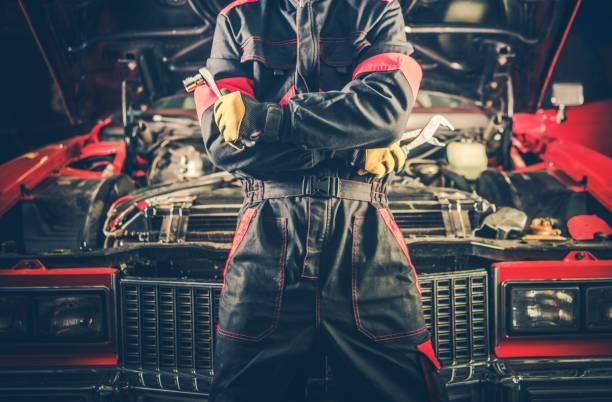
The Auto Mechanic
The Profession of the Auto Mechanic: Complete Guide for Those Who Need to Buy Spare Parts
Are you ready to explore the exciting world of auto mechanics? Are you looking for valuable information about your car parts, such as clutches, services, oil changes, shock absorbers, and brakes? If so, you've come to the right place! In this article, we'll explore every aspect of this fascinating profession in detail, offering helpful tips and advice for anyone interested in purchasing auto parts.
Table of Contents
| Mr.# | Headings |
|---|---|
| 1 | The Role of the Auto Mechanic |
| 2 | Importance of Clutch |
| 3 | The Meaning of the Coupon |
| 4 | Oil Change: When and Why |
| 5 | Shock Absorbers: The Comfort of Driving |
| 6 | Brakes: Safety First |
| 7 | How to Choose the Best Spare Parts |
| 8 | Preventive Maintenance |
| 9 | Save on Spare Parts |
| 10 | Frequently Asked Questions About Auto Parts |
1. The Role of the Auto Mechanic
The auto mechanic is the real hero behind every repair and maintenance of your vehicle. He is the one who knows every single part of the car like his own hand. From simple repairs to the most complex tasks, the auto mechanic is always ready to solve any problem you may have with your car.
Why is it Important to Choose the Right Mechanic?
Choosing the right auto mechanic is essential to ensure that your vehicle is in the hands of a competent and reliable professional. An experienced mechanic will be able to quickly diagnose problems, advise you on the best parts to use, and ensure that the work is done with precision and care.
2. Importance of Clutch
The clutch is one of the most important parts of any manual transmission vehicle. It is responsible for allowing the engine to temporarily disconnect from the transmission, thus allowing the driver to change gears without damaging the engine or the transmission itself.
How to Know if Your Clutch Needs to Be Replaced?
There are several signs that your clutch needs replacing. If you notice a burning smell coming from your car, if you hear strange noises when you press the clutch pedal, or if the clutch lever feels soft or stiff, it may be time to take your vehicle to a mechanic for a checkup.
3. The Meaning of the Coupon
A service is a series of checks and preventative maintenance performed regularly on your vehicle to ensure it functions properly and prolong its useful life. During a service, your mechanic will carefully examine each component of your car, replacing the engine oil, air filters, and oil filters, and checking the condition of other crucial parts.
When is it necessary to have a service?
Generally, it is recommended to have a service every 10,000-15,000 kilometers or once a year, whichever comes first. However, it is always best to follow the specific manufacturer recommendations found in your vehicle's manual.
4. Oil Change: When and Why
An oil change is one of the most important maintenance procedures to ensure the proper functioning of your vehicle's engine. During this operation, used engine oil is drained and replaced with fresh oil, thus ensuring that the engine remains lubricated and protected from wear.
How Often Should I Change My Oil?
The frequency of oil changes depends on several factors, including the type of oil used, driving conditions, and the model of the car. In general, it is recommended to change the oil every 5,000 to 10,000 kilometers or every six months, whichever comes first.
5. Shock Absorbers: The Comfort of Driving
Shock absorbers are crucial components of your vehicle's suspension system, responsible for absorbing shocks and vibrations from the road, thus ensuring a comfortable and safe driving experience.
How to Know if Shock Absorbers Need Replacing?
If you notice that your vehicle bounces more than usual on rough terrain, if you hear strange noises coming from the suspension, or if your car tends to lean excessively when cornering, it might be time to have your shock absorbers checked by your trusted mechanic.
6. Brakes: Safety First
Brakes are one of the most important safety systems on your vehicle, responsible for bringing your vehicle to a safe and controlled stop when necessary. It is essential to keep your brakes in tip-top condition to ensure your safety and that of other road users.
What Are the Signs of Worn Brakes?
If you experience a decrease in braking ability, if you hear squeaking or grinding noises when you press the brake pedal, or if the brake pedal becomes soft or hard, it may be time to replace your brakes. Never ignore signs of brake wear, as it could compromise your safety and the safety of others.
7. How to Choose the Best Spare Parts
When it comes to choosing parts for your vehicle, it is important to pay attention to the quality and compatibility of the products. Choosing quality-assured parts from reliable brands and ensuring that they are compatible with your specific vehicle model is essential to ensuring optimum performance and durability.
8. Preventive Maintenance
Preventive maintenance is the key to keeping your vehicle in tip-top condition and preventing costly breakdowns in the future. Regularly scheduled check-ups and services, replacing worn or faulty components, and following manufacturer recommendations are effective ways to ensure the longevity of your vehicle.
9. Save on Spare Parts
Saving on auto parts doesn't have to mean compromising on quality. There are several strategies for getting quality parts at affordable prices, such as buying online, using quality aftermarket parts, or taking advantage of promotions and discounts offered by dealers.
10. Frequently Asked Questions about Auto Parts
1. How can I know if a part is compatible with my vehicle?
To ensure that a part is compatible with your vehicle, carefully check the product specifications and compare them with your vehicle manual or consult your trusted mechanic for professional advice.
2. What is the difference between OEM parts and aftermarket parts?
OEM (Original Equipment Manufacturer) parts are products made by the same manufacturer that built your vehicle, while aftermarket parts are products made by other companies. Both can be high quality, but OEM parts are designed specifically for your vehicle.
3. How much does a coupon cost on average?
The cost of a service can vary depending on the vehicle model, region, and type of maintenance needed. Typically, a standard service can cost anywhere from 100 to 300 euros, but be sure to get detailed quotes before proceeding with the work.
4. Can I replace the parts myself or is it better to go to a mechanic?
Replacing parts depends on your automotive experience and expertise. Some repairs can be easily done on your own with the help of online tutorials, while others may require specialized skills and equipment, so it is always best to assess your skill level before attempting a DIY repair.
5. What are the consequences of neglecting vehicle maintenance?
Neglecting vehicle maintenance can lead to serious mechanical failures, reduced performance, and increased repair costs in the long run. It could also compromise your safety and that of other road users, so it is important to always pay attention to the regular maintenance of your vehicle.
In conclusion, the profession of an auto mechanic is essential to keep your vehicle in optimal condition and ensure your safety and that of other road users. We hope that this article has provided you with useful information and practical advice for the purchase and maintenance of auto parts. If you have any further questions or concerns, do not hesitate to contact a trusted mechanic for professional advice.
